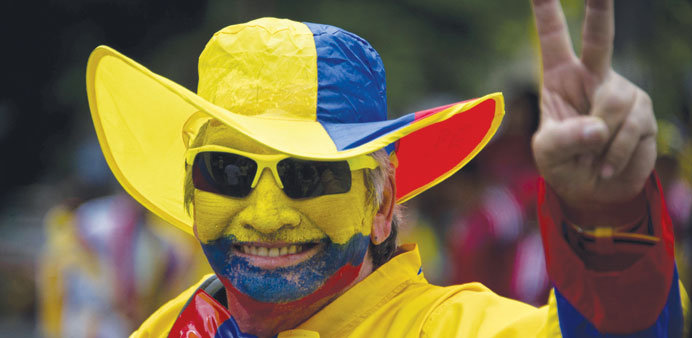Reuters/Brasilia
Already into the last 16 at the World Cup and with two wins under their belt, Colombia finally seem to have cast off their unwanted eccentric label and are being recognised for their entertaining football instead.
Past Colombian World Cup campaigns have been a mixture of the tragic and near-comic, overshadowing the football itself which was often delightful to watch, if somewhat ineffective. Colombia were playing neat, possession football back in the 1990s, long before anyone had mentioned the term tiki-taka, yet Carlos Valderrama’s generation tend to be remembered for exotic haircuts and eccentric goalkeeping, rather than the quality of their play.
Their 1990 campaign ended with one of the most famous goalkeeper blunders of all-time when Rene Higuita, a self-styled goalkeeper-sweeper, lost the ball when attempting to dribble around Cameroon forward Roger Milla in midfield.
The veteran striker accepted the gift, running on to gleefully score into an empty net and perform his famous hip-wiggling goal celebration by the corner flag. Higuita was famous for such forays upfield and went on to be involved in other less publicised incidents in club football. He also scored some spectacular goals from free kicks and performed his unique scorpion kick in a friendly against England at Wembley.
Four years later, Colombia arrived amid huge expectations after winning 5-0 away to Argentina in a qualifier, yet their campaign ended in first round elimination and tragedy.
Shortly after returning home, defender Andres Escobar, who scored an own goal in the 2-1 defeat by the United States, was shot dead in a restaurant car park in Medellin.
Colombia also qualified in 1998 but an ageing team managed only one goal and one win on the way to another first round elimination while the mercurial Faustino Asprilla was sent home early for criticising the team’s tactics.
In the midst of such drama, it was often forgotten that Colombia, with a generation featuring Valderrama, Asprilla, the languid Freddy Rincon and speed merchant Adolfo Valencia, often played very good football.
In the run-up to the 1994 World Cup, they lost only once in 34 matches and turned Colombia into a respected force on the continent. They are still revered in the country itself.
“The memory of that generation is something that cannot be erased,” said coach Jose Pekerman after Thursday’s 2-1 win over Ivory Coast.
“We will not get carried away thinking we can go further than them. We still have a game against Japan to think about,” added the 64-year-old.
After 1998, Colombia went from one extreme to the other, adopting an excessively defensive game, and failed to qualify for three World Cups in succession. But like other South American countries, they were already investing a great deal of time and effort in youth development. They hosted the world under-20 championship in 2011 with great success and won the South American under-20 championship two years later.
They were rewarded with a new generation of talented players who have been carefully nurtured by Pekerman, who himself won the world under-20 championship three times with his native Argentina.
Pekerman has turned Colombia back towards an open, attacking game, but far more dynamic than the 1990s side, as they showed in their 3-0 win over Greece and defeat of a talented Ivory Coast on Thursday.
That has left them with a place in the last 16 and the chance of reaching the quarter-finals for the first time.
“After so many frustrations, we have given satisfaction to our public, who have great passion for football,” said Pekerman. It has been very painful for them to miss out on this event,” he said, referring to their three successive absences.
“Ever since we arrived in Brazil, we had the idea of a good World Cup, to leave a good image and respond to the people who have believed in this team.”

